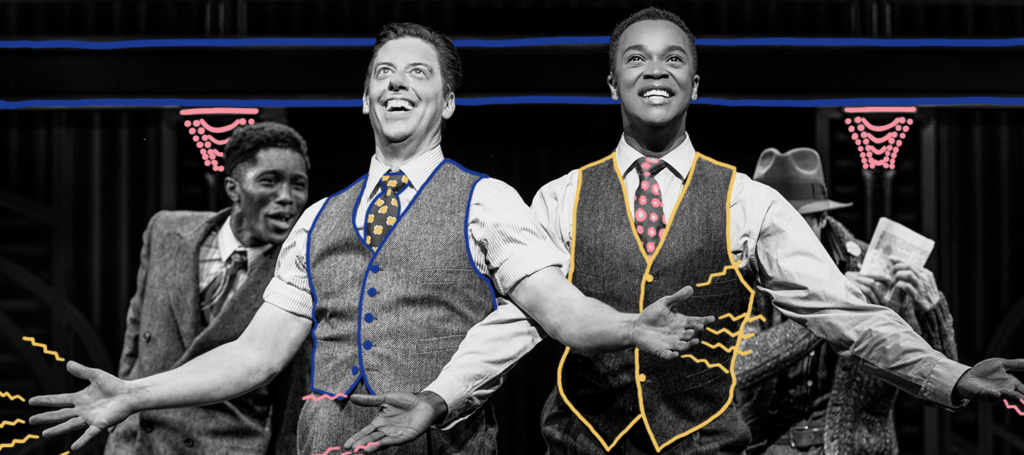


Slickly, Albeit Slowly, ‘Some Like It Hot’, Dances Towards Thoughtful Representation Onstage
If there was an altar to American desirability and mystique, very few people would hold as much space in it as Marilyn Monroe. We feel possessive about her legacy, in a way that drives us to collectively defend her when a TV show fetishizes her life’s traumas. Monroe, in many different ways, signifies America and what it means to be eternally desirable in this country.
Monroe’s 1959 hit Some Like It Hot won her a Golden Globe and has now been adapted into an eponymous Broadway musical that tries contextualizing the 1933 tale of two men who wore dresses and pretended to be women to save their lives, deceive people, and finally win the love of their lives. Monroe’s character, Sugar is played by a Black actor, Adrianna Hicks (who recently played Catherine of Aragon in SIX) while Christian Borle, who is white plays Joe/Josephine, and non-binary actor J. Harrison Ghee stars as Jerry/Daphne.
Obviously, a question to ask with any adaptation is, why do we need to reinvent this for our times? This musical comes at a time of increasing violence against trans and drag communities, which begs a departure from the very cringey “two men in dresses” trope of old Hollywood films. While Joe still uses his Josephine garb to woo Sugar, Jerry builds a world for Daphne and likes it enough to stay in it and revel in a gender euphoria that is heartening to see and indulge in.
Some Like It Hot makes headway into letting us into a queer worldview — a generous space home to both Daphne and Jerry, allowing them the time and grace to be both and either at the same time. Joe is meant to act as the go-between Daphne and the audience and ends up asking questions like, “Are you going to wear a dress for the rest of your life?” — a slightly on-the-nose line of questioning we should be happy to be retiring from stories that center trans lives.
Written by Matthew López and Amber Ruffin, Some Like It Hot does the legwork of contextualizing the narrative and doesn’t just swap out the white female lead for a Black actor. Hicks’ Sugar is someone who grew up in segregated Georgia, watching films in matinee shows, and sitting in balcony seats because she wasn’t allowed into the general seating area. She wants to be a movie star but doesn’t kid herself that it’s going to be easy. As she sings “At the Old Majestic Nickel Matinee,” she sings of her life but also builds a picture of Black cinephilia — establishing a relationship that is driven by a desire for something that is gatekept and forbidden. It is a layer that makes Hicks’ character someone we’ve all been at some point in our lives — a far cry from Monroe who will always exist as an inert star defined by its impossible-to-touch mystique.
Natasha Yvette Williams is electric as Sweet Sue, the fiery Black businesswoman who conducts an all-women band through its cross-country tour. Through the support she gives her musicians, we see a legacy of Black mentorship and camaraderie in the arts, a history that isn’t often written about. She is a straight talker, runs a successful business, and is smart enough to dodge cops during Prohibition. Sweet Sue is a pioneer, an absolute queen who steals the show every time she sings.
For most parts, the rewriting of Some Like It Hot works, especially in the ways in which it doesn’t give us a Black woman and a Black non-binary lead and expects us to be happy in the name of mere representation. It digs deep where it can but Joe’s white straightness often stands in the way of the things the narrative wants to change. Kevin Del Aguila’s kind-hearted Osgood also emerges from an interesting binary, perhaps a nod to how none of our lives are as “straight” as we think them to be.
In a world where drag queen story hours come under attack and gender-neutral bathrooms are weaponized, it is heartening to watch Some Like It Hot with its “actually, drag makes us all better people” message. These stories and their reworkings are important but the musical would be a far better depiction of the lives it talks about, if it were written in collaboration with people from the communities it portrays. As entertaining as the musical is — with the fantastic costumes, sets, and tap dances — it’s still a work in progress when it comes to creating art that remains faithful to the trans experience it builds itself around.
Keep Reading

Audra McDonald Does Magic in the Lackluster ‘Ohio State Murders’
Adrienne Kennedy has just opened the recently renamed James Earl Jones Theatre with her Broadway debut― Ohio State Murders. And gee, what an opening it is. The production is led by six-time Tony-Award winner, Audra McDonald under the helm of Tony Award-winning director Kenny Leon, with a phenomenal set by Tony Award-winning designer Beowulf Boritt, […]
Read More
“Ain’t No Mo’” is a Ravishing Bouquet of Blackness
The revolutionary power of Black joy takes center stage in the Broadway debut of Jordan E. Cooper’s ravishing play, Ain’t No Mo.’ Much like its 2019 production at the Public Theater, this uproariously gut-punching transfer posits a world wherein every Black person in the United States is offered a one-way ticket to Africa. Far from […]
Read More












